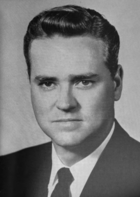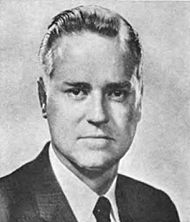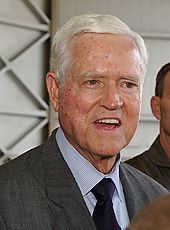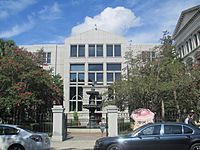Fritz Hollings facts for kids
Quick facts for kids
Fritz Hollings
|
|
|---|---|
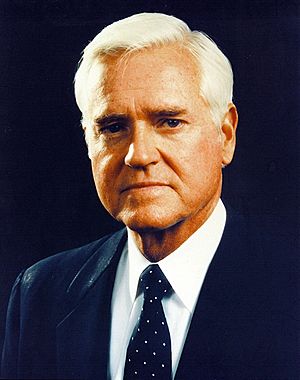 |
|
| United States Senator from South Carolina |
|
| In office November 9, 1966 – January 3, 2005 |
|
| Preceded by | Donald Russell |
| Succeeded by | Jim DeMint |
| 106th Governor of South Carolina | |
| In office January 20, 1959 – January 15, 1963 |
|
| Lieutenant | Burnet R. Maybank Jr. |
| Preceded by | George Timmerman |
| Succeeded by | Donald Russell |
| 77th Lieutenant Governor of South Carolina | |
| In office January 18, 1955 – January 20, 1959 |
|
| Governor | George Timmerman |
| Preceded by | George Timmerman |
| Succeeded by | Burnet Maybank |
| Member of the South Carolina House of Representatives from Charleston County |
|
| In office 1949–1954 |
|
| Personal details | |
| Born |
Ernest Frederick Hollings
January 1, 1922 Charleston, South Carolina, U.S. |
| Died | April 6, 2019 (aged 97) Isle of Palms, South Carolina, U.S. |
| Political party | Democratic |
| Spouses |
Martha Salley
(m. 1946; div. 1971)Rita Liddy
(m. 1971; died 2012) |
| Children | 4 |
| Education | The Citadel (BS) University of South Carolina, Columbia (LLB) |
| Awards | Bronze Star European-African-Middle Eastern Campaign Medal |
| Signature | |
| Military service | |
| Allegiance | |
| Branch/service | |
| Years of service | 1942–1945 |
| Rank | Captain |
| Battles/wars | World War II |
Ernest Frederick "Fritz" Hollings (January 1, 1922 – April 6, 2019) was an American politician. He served as a United States senator for South Carolina from 1966 to 2005. He was a member of the Democratic Party. Before becoming a senator, he was the 106th Governor of South Carolina. He also served as the 77th Lieutenant Governor and was a member of the South Carolina House of Representatives. He worked with Senator Strom Thurmond for 36 years. This made them the longest-serving Senate team in history. When he passed away, he was the oldest living former U.S. senator.
Contents
Early Life and Education
Fritz Hollings was born in Charleston, South Carolina. His parents were Wilhelmine Dorothea Meyer and Adolph Gevert Hollings, Sr. He grew up in Charleston.
He went to The Citadel and graduated in 1942. After that, he studied law at the University of South Carolina School of Law. He finished his law degree in 1947. Then, he started working as a lawyer in Charleston.
Military Service in World War II
During World War II, Hollings served in the United States Army. He was an artillery officer from 1942 to 1945. He fought in important campaigns in North Africa and Europe. For his brave service, he received the Bronze Star Medal. He also earned the European-African-Middle Eastern Campaign Medal.
Beginning His Political Career
After the war, Hollings started his political journey. He was elected to the South Carolina House of Representatives in 1949. He served three terms there until 1954. His fellow lawmakers even chose him as Speaker Pro Tempore.
In 1954, he was elected Lieutenant Governor of South Carolina. Then, in 1958, at just 36 years old, he became the Governor.
Governor of South Carolina
Fritz Hollings served as governor from 1959 to 1963. During his time, he worked hard to make education better in South Carolina. He also helped bring more businesses and jobs to the state. He started the state's technical education system. He also created its educational television network.
Hollings pushed for higher salaries for teachers. He wanted them to earn closer to the average pay in the region. He believed that education was key for economic growth. He said, "Today, in our complex society, education is the cornerstone upon which economic development must be built—and prosperity assured."
During his term, the Confederate battle flag was placed above the South Carolina State House. This was done in 1962 to mark the 100th anniversary of the Civil War. In 2015, the flag was finally removed from the State House grounds. This happened after a tragic shooting in Charleston.
In 1963, before the first African American student, Harvey Gantt, was peacefully admitted to Clemson University, Hollings spoke to the state legislature. He emphasized that South Carolina must follow the law. He said it should be done "with dignity" and "with law and order."
Serving as a United States Senator
In 1962, Hollings tried to become a U.S. Senator but lost. However, in 1966, he won a special election for a Senate seat. He was sworn in quickly, which gave him more seniority than other new senators.
He was very popular and kept winning re-election. He became one of the longest-serving senators in U.S. history. For 36 years, he served alongside Republican Senator Strom Thurmond. They worked together often for South Carolina. Their long time in office gave South Carolina a strong voice in national politics.
Fighting Hunger and Poverty
In the late 1960s, Hollings became famous for his "Hunger Tours." He visited poor areas in South Carolina to see the problems firsthand. He wrote a book called The Case Against Hunger. He wanted to create a national plan to end hunger.
He faced criticism for bringing attention to poverty in his state. But Hollings believed it was important to act. He testified before a Senate committee about what he saw. He suggested giving free food stamps to those most in need. Soon after, a pilot program for free food stamps began in South Carolina.
Key Issues and Policies
Hollings worked on many important issues. In the 1970s, he opposed ending price controls on domestic oil. He thought it would cause economic problems. He also supported early U.S. recognition of Bangladesh.
He was concerned about government spending. He helped create the Gramm-Rudman-Hollings Act. This law aimed to set limits on how much the government could spend. He also introduced a bill to bring back a limited military draft for young people.
Presidential Campaign
In 1984, Fritz Hollings ran for President of the United States. He sought the Democratic nomination. He was known for his quick wit and experience. He also called for a freeze on the national budget. However, he was not as well-known as other candidates. He dropped out of the race after the New Hampshire primary.
Later Years in the Senate
Hollings remained popular in South Carolina. He won several more elections. In his last Senate race in 1998, he won with 52% of the vote.
In 2003, he announced he would not run for re-election in 2004. He felt that it was becoming harder for Democrats to win statewide in South Carolina. Republican Jim DeMint took his place.
Throughout his career, Hollings was a moderate politician. He supported many civil rights bills. He voted to renew the Voting Rights Act in 1982. On money matters, he was generally conservative.
He also focused on the entertainment industry. He supported laws that aimed to protect digital content. This led to a computer chip being nicknamed the "Fritz chip" after him.
Life After the Senate
After retiring from the Senate, Hollings continued to share his thoughts. He wrote articles for newspapers and the Huffington Post. In 2008, he wrote a book called Making Government Work. In it, he shared his ideas for improving how Washington works. He suggested reducing campaign spending.
Several places and programs are named after him. The Hollings Cancer Center in Charleston was established in 1993. In 2005, he started the Hollings Scholarship. This program gives college students internships with the National Oceanic and Atmospheric Administration. He also helped create the Hollings Center for International Dialogue. This group helps promote understanding between the United States and countries in the Middle East and North Africa.
Fritz Hollings passed away on April 6, 2019, at his home in Isle of Palms, South Carolina. He was 97 years old. Former Vice President Joe Biden spoke at his funeral.
Images for kids
See also
 In Spanish: Ernest Hollings para niños
In Spanish: Ernest Hollings para niños
 | Kyle Baker |
 | Joseph Yoakum |
 | Laura Wheeler Waring |
 | Henry Ossawa Tanner |


